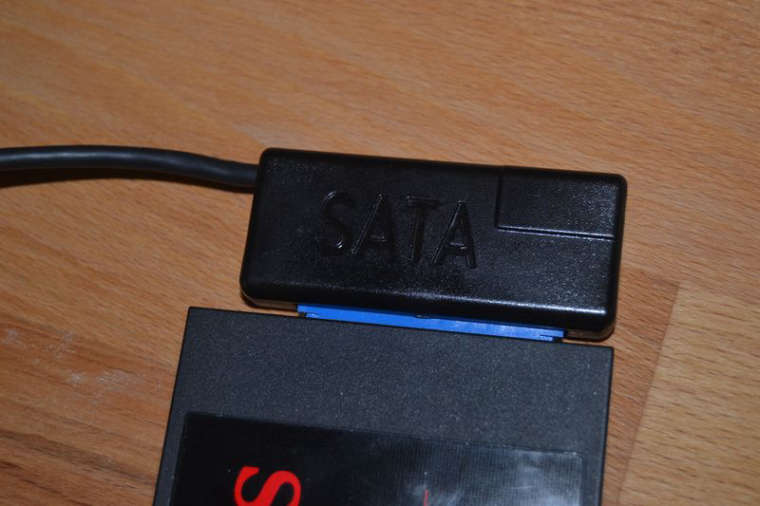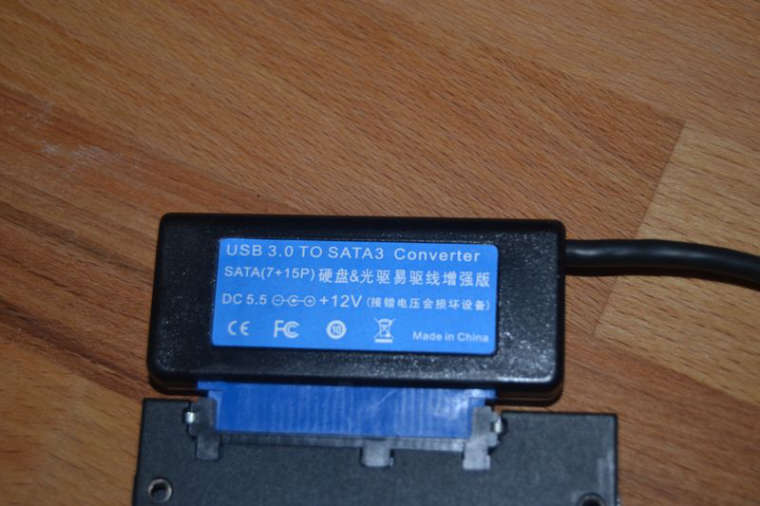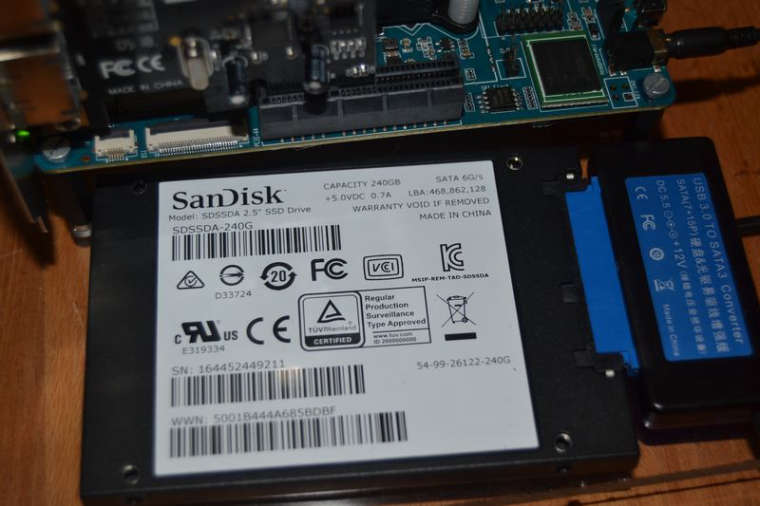Die Fa. Pine64 verkauft auch einen USB 3.0-SATA Adapter.
Ich habe hier schon mittlerweile eine kleine Sammlung, aber dieser wurde mir empfohlen, so das ich ihn bei der letzten Bestellung mal mit bestellt hatte.


Hardware

Betriebssystem
rock64@rockpro64v2_1:/$ uname -a
Linux rockpro64v2_1 4.4.132-1075-rockchip-ayufan-ga83beded8524 #1 SMP Thu Jul 26 08:22:22 UTC 2018 aarch64 aarch64 aarch64 GNU/Linux
rock64@rockpro64v2_1:/$
Was bekommen wir für Ausgaben mit dmesg (gekürzt)?
rock64@rockpro64v2_1:/$ dmesg | grep -E "usb|xhci"
[63534.630067] usb 4-1: New USB device found, idVendor=152d, idProduct=0578
[63534.630101] usb 4-1: New USB device strings: Mfr=1, Product=2, SerialNumber=3
[63534.630123] usb 4-1: Product: USB to ATA/ATAPI Bridge
[63534.630143] usb 4-1: Manufacturer: JMicron
[63534.630163] usb 4-1: SerialNumber: 0123456789ABCDEF
[63535.157987] xhci-hcd xhci-hcd.6.auto: ERROR Transfer event for disabled endpoint or incorrect stream ring
[63535.159425] xhci-hcd xhci-hcd.6.auto: @0000000072cfb0a0 00000000 00000000 1b000000 01078000
Das ist nur der Teil, ab dem ich die Platte an den USB3.0 Port gesteckt habe.
Speedtest
rock64@rockpro64v2_1:/mnt$ sudo iozone -e -I -a -s 100M -r 4k -r 16k -r 512k -r 1024k -r 16384k -i 0 -i 1 -i 2
Iozone: Performance Test of File I/O
Version $Revision: 3.429 $
Compiled for 64 bit mode.
Build: linux
Contributors:William Norcott, Don Capps, Isom Crawford, Kirby Collins
Al Slater, Scott Rhine, Mike Wisner, Ken Goss
Steve Landherr, Brad Smith, Mark Kelly, Dr. Alain CYR,
Randy Dunlap, Mark Montague, Dan Million, Gavin Brebner,
Jean-Marc Zucconi, Jeff Blomberg, Benny Halevy, Dave Boone,
Erik Habbinga, Kris Strecker, Walter Wong, Joshua Root,
Fabrice Bacchella, Zhenghua Xue, Qin Li, Darren Sawyer,
Vangel Bojaxhi, Ben England, Vikentsi Lapa.
Run began: Sun Jul 29 14:09:11 2018
Include fsync in write timing
O_DIRECT feature enabled
Auto Mode
File size set to 102400 kB
Record Size 4 kB
Record Size 16 kB
Record Size 512 kB
Record Size 1024 kB
Record Size 16384 kB
Command line used: iozone -e -I -a -s 100M -r 4k -r 16k -r 512k -r 1024k -r 16384k -i 0 -i 1 -i 2
Output is in kBytes/sec
Time Resolution = 0.000001 seconds.
Processor cache size set to 1024 kBytes.
Processor cache line size set to 32 bytes.
File stride size set to 17 * record size.
random random bkwd record stride
kB reclen write rewrite read reread read write read rewrite read fwrite frewrite fread freread
102400 4 14129 21565 25850 27179 10674 12038
102400 16 47895 51628 77984 93926 32673 36582
102400 512 148014 68789 191535 191107 191898 222616
102400 1024 103397 253761 225274 226578 221721 259188
102400 16384 317283 337039 365356 368479 364317 325526
iozone test complete.
dd
Schreiben
root@rockpro64v2_1:/mnt# dd if=/dev/zero of=sd.img bs=1M count=4096 conv=fdatasync
4096+0 records in
4096+0 records out
4294967296 bytes (4.3 GB, 4.0 GiB) copied, 37.9612 s, 113 MB/s
Lesen
root@rockpro64v2_1:/mnt# dd if=sd.img of=/dev/null bs=1M count=4096
4096+0 records in
4096+0 records out
4294967296 bytes (4.3 GB, 4.0 GiB) copied, 16.372 s, 262 MB/s
Fazit
Ich glaube die Platte kann weg  Habt Ihr andere Ergebnisse? Dann her damit.
Habt Ihr andere Ergebnisse? Dann her damit.



 Habt Ihr andere Ergebnisse? Dann her damit.
Habt Ihr andere Ergebnisse? Dann her damit.